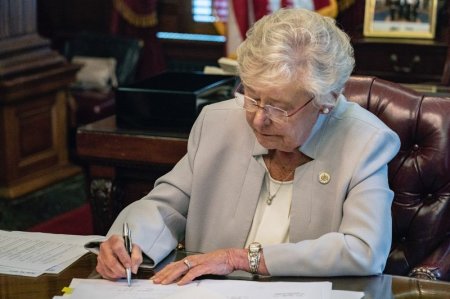Alabama gov. signs law requiring convicted child molesters to be chemically castrated before parole

Alabama Gov. Kay Ivey signed a controversial bill into law Monday that requires chemical castration for sexual predators convicted of offenses against children.
Before they can be released on parole, convicts who were charged with committing crimes against children age 13 and younger would have to pay for the treatment which uses medication to reduce testosterone and other chemicals that drive libido.
The bill, known as HB 379, was introduced by Republican state Rep. Steve Hurst and was passed by state legislators on May 30.
“I’m very serious,” Hurst told AL.com of the new law. “Not only did I want it to pass, I want to follow it on through to the future where we can try to improve it. One of the ultimate goals that I want to do is for us to track it and to make sure what medication works for what individuals.”
He previously told local news station WSFA of Montgomery that if he had his way, convicted child molesters would be castrated for life.
"If they're going to mark these children for life, they need to be marked for life," Hurst said. "My preference would be if someone does a small infant child like that, they need to die. God's going to deal with them one day."
Hurst also told AL.com that he has been getting messages of support from sexual abuse victims from around the world for seeking to keep child molesters in check.
“It’s amazing how many phone calls and how many emails I’ve gotten,” he said. “People not just in the state of Alabama but all over the world ...”
Convicted child molesters would have to begin treatment at least one month prior to their release from custody "and shall continue receiving treatment until the court determines the treatment is no longer necessary."
Offenders who cannot afford to pay for the treatment "may not be denied parole based solely on his or her inability to pay for the costs associated with the treatment,” however.
Many supporters of the law, which is expected to take effect in September, agree that the new law is a step in the right direction to help prevent child abuse. But others, like Randall Marshall, executive director of the ALCU of Alabama, told AL.com that the treatment has been rarely used in other states and believes it could also be in violation of the U.S. Constitution.
“It’s not clear that this actually has any effect and whether it’s even medically proven,” Marshall told AL.com. “When the state starts experimenting on people, I think it runs afoul of the Constitution.”
Attorney Raymond Johnson agrees. He told CBS 42 that offenders are likely to challenge the law.
"They’re going to challenge it under the Eighth Amendment ... They’re going to claim that it is cruel and unusual punishment for someone who has served their time and for the rest of their life [to] have to be castrated,” he argued.
Alabama joins several other states in approving chemical castration for some sexual offenses. California was the first state to approve the use of chemical castration for repeat child molesters as a condition of their parole.
Georgia, Iowa, Louisiana, Montana, Oregon, Texas and Wisconsin have also experimented with chemical castration.






















